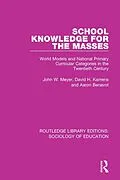First published in 1992, this book presents unique quantitative data on the content coverage of primary education in a large number of countries since 1920. It demonstrates that these curricular outlines tend to be surprisingly similar across very disparate countries, and suggests the world processes that produced this result.
Specifically, the study shows that the contemporary primary curriculum dates from changes in the late nineteenth century; that there has been a general shift towards a 'social studies' subject; that instruction in mathematics and sciences has tended to expand; that there have been substantial increases in foreign language instruction (and changes in the languages taught); and that instruction in the arts and physical education come to the standard world education model much later than other subjects.
This work will be of particular interest to those studying primary curriculum, international education and the sociology of education.
Autorentext
John Meyer, David Kamens, Aaron Benavot
Inhalt
List of Tables
Author's Preface
1. Introduction
Part I: The Worldwide Institutionalization of Primary School Curricula
2. Background: A Perspective on the Curriculum and Curricular Research John W. Meyer
3. Description of the Curriculum Database and the Methodologies Employed Aaron Benavot
4. Knowledge for the Masses: World Models and National Curricula, 1920-1986 Aaron Benavot, Yun-Kyung Cha, David H. Kamens, John W. Meyer and Suk-Ying Wong
5. The Origins and Expansion of Primary School Curricula: 1800-1920 Yun-Kyung Cha
6. Variant Forms: Cases of Countries with Distinct Curricula David H. Kamens
Part II: Studies of Specific Subject Areas
7. Language Instruction in National Curricula, 1850-1986: The Effect of the Global System Yun-Kyung Cha
8. A Comparative and Historical Analysis of Mathematics and Science Curricula, 1800-1986 David H. Kamens and Aaron Benavot
9. The Evolution and Organisation of the Social Science Curriculum Suk-Ying Wong
10. Values Education in the Curriculum: Some Comparative Empirical Data Yun-Kyung Cha, Suk-Ying Wong and John W. Meyer
11. The Formation of New Subjects in Mass Schooling: Nineteenth Century Origins and Twentieth Century Diffusion of Art and Physical Education David H. Kamens and Yun-Kyung Cha
12. Conclusion: Accounting for a World Curriculum John W. Meyer and David H. Kamens
Bibliography
Index
